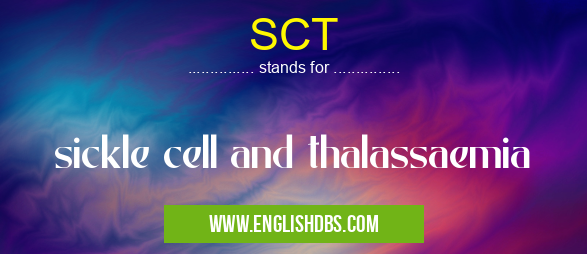What does SCT mean in BRITISH MEDICINE
SCT stands for Sickle Cell and Thalassaemia. These are two of the most common inherited blood disorders in the world. Each disorder has its own set of characteristics, treatments, and effects on one's health and well-being. To better understand these illnesses, it is important to know what SCT is and how it affects individuals with this condition.

SCT meaning in British Medicine in Medical
SCT mostly used in an acronym British Medicine in Category Medical that means sickle cell and thalassaemia
Shorthand: SCT,
Full Form: sickle cell and thalassaemia
For more information of "sickle cell and thalassaemia", see the section below.
Essential Questions and Answers on sickle cell and thalassaemia in "MEDICAL»BRITMEDICAL"
What is Sickle Cell & Thalassaemia?
Sickle Cell & Thalassaemia (SCT) is a group of inherited genetic blood disorders characterized by abnormal production of red blood cells or platelets, leading to various clinical complications such as anemia, jaundice, leg ulcers and fatigue. In some cases, SCT can also cause chronic medical problems including organ damage.
What are the types of SCT?
There are two main types of SCT - sickle cell anemia and thalassemia. Sickle cell anemia is caused by a mutation in the hemoglobin molecule which leads to abnormally shaped red blood cells that can easily become stuck in small vessels and impair oxygen supply to body organs. Thalassemia is caused by a deficiency of hemoglobin resulting in an inadequate number of red blood cells being produced in the bone marrow.
Who is at risk for developing SCT?
Anyone can be born with SCT, but it most commonly affects individuals from African or Mediterranean descent. It can also occur in Asian countries such as Thailand, India and Malaysia where large numbers of people have intermarried over many generations resulting in increased risk for carrying the gene coding for this condition.
How is SCT treated?
Treatment for SCT depends on the type but typically involves supportive care designed to minimize symptoms such as regular transfusions or medication to reduce pain or treat infections more effectively than antibiotics alone could accomplish. Some patients may require splenectomy (surgical removal of spleen) if they have severe thalassemia or recurrent episodes of fever due to bacterial infection related to low platelet count associated with sickle cell anemia.
Are there any preventive measures for SCT?
Yes, there are preventive measures for reducing the risk of progression or complications from SCT including avoiding excessive exposure to sunlight due to increased risk of sunburns associated with certain mutations involved; engaging in regular exercise; quitting smoking; preventing dehydration through adequate water intake; avoiding high altitude areas; getting vaccinated against potential infections like hepatitis B; controlling diabetes if present; getting regular checkups regularly; being aware of one's family history involving genetic diseases etc.
Final Words:
Sickle Cell & Thalassaemia (SCT) is a serious condition that should be managed carefully through appropriate lifestyle modifications, treatment options, and preventative measures recommended by a healthcare provider. Although there are ways to manage symptoms associated with this condition like transfusions or surgical interventions when necessary, it cannot be cured completely yet so awareness about this disorder among at-risk individuals remains essential for better management outcomes overall.
SCT also stands for: |
|
| All stands for SCT |
